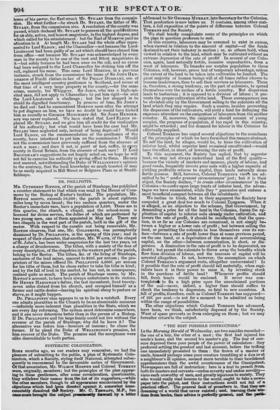DR. PHILLPOTTS.
MR. CUTHBERT RIPPON, of the parish of Stanhope, has published a counter-statement to that which was read in the House of Com- mons by the Bishop of Exeter's brother. The population, Mr. RIPPON asserts, exceeds 10,000; the parish is about eighteen miles long by seven broad ; the two eastern quarters, under the Rector's immediate care, have a population of 3,600. There are in this quarter, the church, a chapel, and the school-room is licensed for divine service, the duties of which are performed by two young men, one of them appointed in May last. There are two chapels in the west part of the parish, both in the gift of the rector. With respect to the curates not being removable, Mr. RIPPON observes, that one, Mr. GOLDSMITH, was peremptorily dismissed by Dr. PHILLPOTTS, in the spring of this year ; and in respect of their character, that another, Mr. WAITE, of the chapel of St. John's, has been under suspension for the last two years, on a charge of drunkenness. The tithes, with a moiety of the fees of every description, of the chapelries in the western part of the parish, belong to the Rector. The tithes, &c. of the living of Stanhope, exclusive of the lead mines, amount to 900/. per annum ; the pro- prietors of the mines offered Dr. PHILLPOTTS 4,0001. per annum for his tithe of them, but he chose rather to take his tithe in kind ; and by the fall of lead in the market, he has not, in consequence, realized quite so much. The parish of Stanhope seems, by Mr. RIPPON'S account, to have been always unfortunate in its rectors. Sir HENRY HARDINGE'S father, the last incumbent, lived twenty- seven miles distant from his church, and occupied himself as a farmer and cattle-dealer—leaving his spiritual sheep to pasture or starve, as it might happen. Dr. PHILLPOTTS' case appears to us to lie in a nutshell. Every one admits pluralities in the Church to be an abominable nuisance —infinitely more indecent than pluralities in the State, which we are every day reforming. The system must determine somewhere, and it can never determine better than in the person of a Bishop. If Dr. PHILLPOTTS and his large family could not live without the revenue of the parish of Stanhope, why did he leave it? The alternative was before him—honours or income ; he chose the former. If he plead the Duke of WELLINGTON'S promise, let him recover of the Duke. The promise and the acceptance were .alike discreditable to both parties.


























 Previous page
Previous page